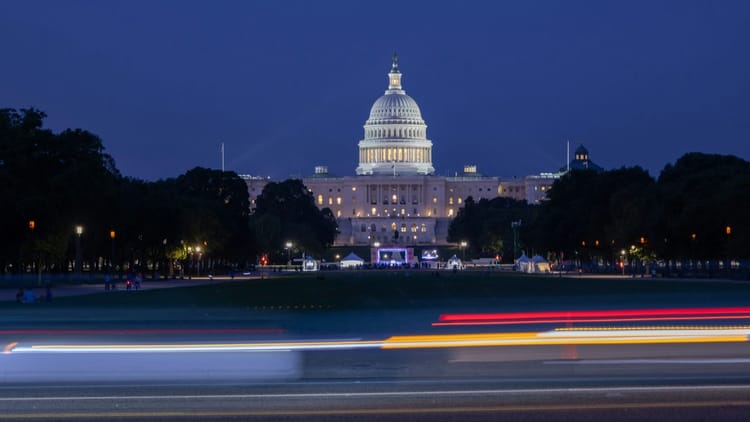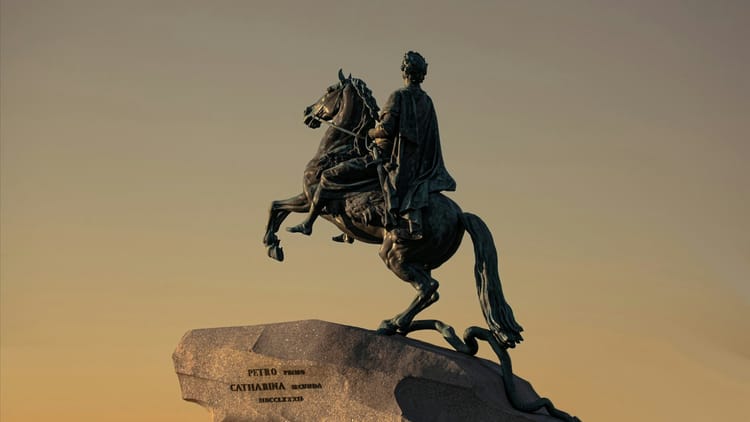The gathering

Recently: Where’s all the money coming into American think tanks from? Ben Freeman on the enormous foreign-government “donations” flowing through Washington, D.C.
Today: A parade for dictators in Beijing. Putin extends his China visit while Modi beats it back home. A U.S. federal judge rules against military deployments in cities. Sudan’s deadliest landslide in recent memory. & France’s government teeters on collapse.
+ Michael Bluhm on August’s sudden, big drop in tech-company share prices.
& New music from Cameo Blush ...
The Legion assembles in Beijing
China’s President Xi Jinping will host an extremely unusual military parade on Wednesday in Beijing’s Tiananmen Square—including Russia’s President Vladimir Putin, North Korea’s Supreme Leader Kim Jong Un, and Iran’s President Masoud Pezeshkian among 26 world leaders—commemorating the end of World War II.
Kim will get there in his famous armored train—his first visit to China visit 2019. The parade—featuring a massive display of Chinese military hardware, including hypersonic weapons and nuclear-capable missiles—marks the first time leaders from what some call an “axis of upheaval” (though there are other sobriquets) will all appear together publicly.
The optics would seem intended to project a conspicuous challenge to the global dominance of America and the West.
- See “Legion of doom.”
Diplomatic triangulation in Beijing
Putin and Xi, meanwhile, held bilateral talks in Beijing yesterday following the Shanghai Cooperation Organization summit, with Putin staying for Wednesday’s military parade—while Modi returned to India.
The choreographed diplomacy reveals careful calibration: India maintains its SCO participation while avoiding the more provocative military display, suggesting New Delhi’s limits to how far it will publicly align against Washington.
Putin, however, has extended his China visit to four days, demonstrating the deepening Moscow-Beijing partnership at the heart of the emerging bloc.
- See “Trust, but verify.”
Urban militarization in the U.S.
A U.S. federal judge has ruled that President Donald Trump’s deployment of National Guard troops to Los Angeles violates federal law, as the administration plans similar operations for Chicago—despite objections from Illinois officials.
Judge Charles Breyer found that the L.A. deployment “willfully” violated the Posse Comitatus Act, which bars the military from civilian policing. Despite the rebuke, Trump has signed executive orders creating “specialized units” for future urban deployments, with Chicago his stated next target.
Fundamentally, the legal clash goes to the question of constitutional boundaries around presidential power to militarize domestic policing—and have prompted Chicago Mayor Brandon Johnson to sign preemptive orders prohibiting local cooperation with any federal troops.

A catastrophic convergence in Sudan
A landslide in Sudan’s Darfur region completely destroyed the village of Tarasin on Sunday, killing an estimated 1,000 people, with only one survivor reported by the controlling Sudan Liberation Movement-Army.
The mountainous refuge had become home to thousands fleeing Sudan’s civil war, where both displaced civilians and aid are nearly impossible to reach during the area’s rainy season.
The disaster compounds what the UN calls the world’s worst humanitarian crisis, as two competing governments wage war and children die daily from hunger in areas where neither side allows adequate access to relief.
Political deadlock in Paris
France’s Prime Minister François Bayrou faces the potential collapse of his government as opposition parties threaten no-confidence votes over budget disputes and immigration policies.
The crisis deepens France’s political instability following President Emmanuel Macron’s gamble on snap elections that fragmented parliament, leaving no party with a governing majority.
Bayrou’s struggle to maintain power in France reflects broader governance challenges across Europe, as traditional center-right and center-left coalitions fracture under pressure from populist movements.
- See “A leadership void.”
Hungry for an alternative to dystopian anger? Join a gathering of code breakers, hackers, and puzzle solvers. You’ll leave optimistic—we promise.

The $750 billion question
Despite all the disruptions of global trade from U.S. President Donald Trump’s on-again, off-again tariff policies, U.S. stock indices continued to hit record highs through much of the summer, largely thanks to the steadily rising prices of the world’s biggest tech firms.
Until late August.
On Tuesday, August 20, the NASDAQ Composite fell 1.46 percent, followed by another 0.67 percent drop the next day. The S&P 500 posted four consecutive days of losses. Nvidia fell 3.5 percent on Tuesday alone. Palantir, a star of the AI trade, plummeted 9.35 percent on the same Tuesday and continued falling. Advanced Micro Devices and Marvell Technology each fell almost 7 percent for the week. All of the Magnificent Seven tech stocks (Apple, Microsoft, Nvidia, Google, Amazon, Meta, and Tesla) fell on both Tuesday and Wednesday.
Markets have since recovered—August still ended as the fourth consecutive positive month for major indices. But it remains striking that the value of the world’s most valuable companies suddenly plunged all at once.
Why?
Your loyal guide to a changing world.
Membership with The Signal means exclusive access to premium benefits:
- Regular profiles on the questions behind the headlines
- In-depth feature interviews with our network of specialist contributors from across America and around the world
- The despatch, our weekly current-affairs and cultural-intelligence briefing
- Early access to new products, including print extras
It also means vital support for an independent new enterprise in current-affairs journalism.
‘One Chance’
Cameo Blush is a producer in London, working in experimental dance circles, and the creator of this track, which we might best describe as post-dubstep … dubstep being the genre—with its distinctive, highly syncopated beats, prominent bass lines, and dark melodies—that brought producers like Burial and Joy Orbison to prominence the mid and late 2000s. “One Chance” has the bass-forward wobble of that original dubstep sound but with the high BPM count of modern techno (here, 141).





